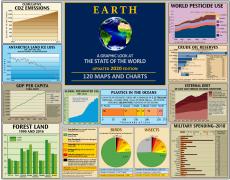Toxics+&+biotechnology
There's nothing tagged as toxics+&+biotechnology on the Global Education Project EARTH website. Please try a different search.Sign up for EARTH Dispatches
Enter you email below to get jaw dropping charts and maps delivered straight to your inbox.
Get the EARTH presentation
A 150 page high-resolution PDF containing all updated maps, charts and data on EARTH website; use as an information-packed educational slide show, printed booklet or a set of single-page handouts.
Learn More

